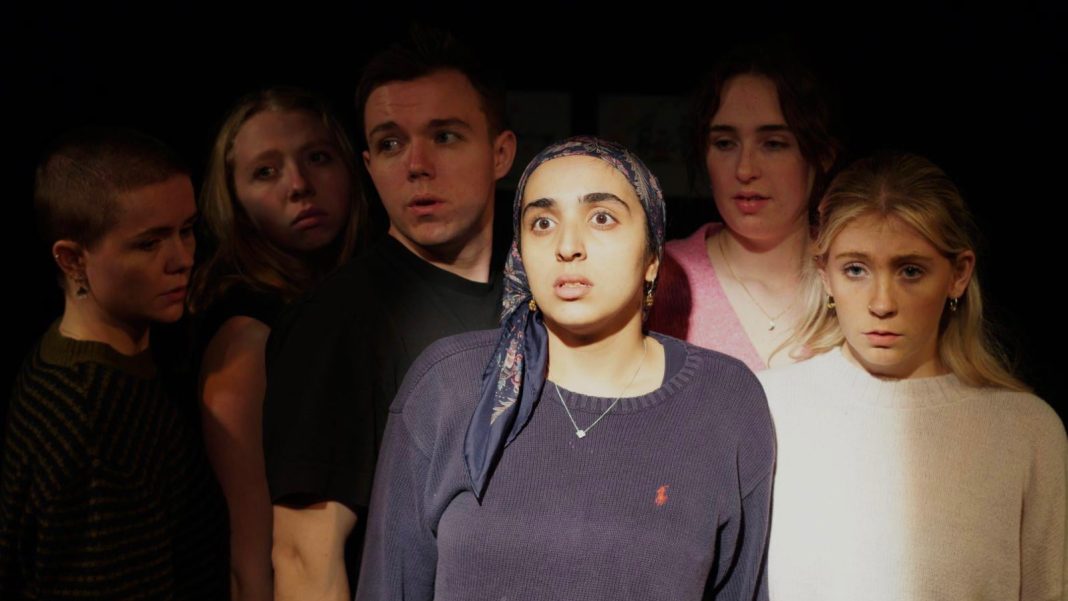Tidal Theatre’s Launa (at the BT 18-22nd November) is exactly the kind of play that the student drama scene needs more of. It was original, witty, bold and colourful, with an incredibly authentic portrayal of grief in all its forms.
Rowan Brown’s impressive original script explores the emotional turmoil of Edna (Sanaa Pasha), a once hopeless romantic processing the death of her daughter Launa (Coco Scanlon) at just six years old. The production’s choreography reflected Edna’s dreamlike state, in which she tortures herself with imaginary conversations with shifting versions of a grown-up Launa. Alongside these central interactions, Edna’s husband Jo (Callum Beardmore), sister, Beth (Kitty Brown), and mother, Helen (Rosie Sutton), break through her preoccupied state to attempt to encourage her to begin her life again.
Sanaa Pasha was electric as Edna. She was captivating to watch from the initial moment that her character walked into the surroundings of the flat, throwing off Edna’s work gear and putting on tracksuit bottoms to signify the mental defeat that would characterise her preceding interactions. Her physicality was a mechanism for portraying the pain inside Edna’s head: she spun, danced manically, and curled into a ball on the floor, conveying different facets of despair. Pasha’s ability to portray the desolation that Edna was feeling through facial expression was also very impressive.
Intensifying the pain of Edna’s thoughts was Launa’s onstage presence, a now grown woman in childish pyjamas. Co-directors Emily Polhill and Rowan Brown deserves commendation for the presentation of their relationship: at different points Scanlon as Launa physically clung to Edna’s side, put on a whiney babyish voice, and loomed over Edna while accusing her of poor parenting. The effect was to give the audience a deeper understanding of the intensely self-critical nature of Edna’s thoughts. In one especially haunting moment, the ensemble and main actors came together to recreate a time when Edna, frustrated at Launa disturbing her in the night, locked her in a room. Launa and the ensemble created a chilling chorus of “let me out” as Edna grew visibly panicked. Scanlon was skilled at switching between Launa’s childish, tender side, and her angry outbursts used to reflect Edna’s guilt back at her. The ability of these moments to generate sympathy for Edna is testament to Brown’s skillful writing.
Edna’s refusal to cease reliving her time with Launa is the main source of conflict in the play. A key theme is how to be there for someone who stubbornly refuses help, but is clearly struggling. The relationship between Edna and her husband made it clear that Edna had not considered the ways in which Jo must be hurting. Caught up in her own grief, she refuses to admit that she’s been talking to Launa in her sleep as he begs her: “I want to hear you say it.” Lost in the confusion of what her life has become, Brown’s writing showed that Edna was unable to appreciate how far she had pushed Jo away until it was too late.
Bringing some much needed comedic relief was Kitty Brown as Beth, bursting into a scene to make an awkward attempt at meaningful conversation with Edna, who still ironically retained a sense of protectiveness over her younger sister. Particularly funny was Beth’s attempt to suggest something positive about her own partner, who no one remembers is called Toby, other than the fact that he’s…there, and makes risotto. As the action progressed, Brown was convincing in becoming more firm with Edna, warning her not to indulge in grief and, in one particularly well-written line, telling her she’s “spoilt on loss”.
As someone that loves the combination of naturalistic acting and physical theatre, I felt that the use of an ensemble (Mary Stillman, Wren Talbot-Ponsonby, and Katie Maybin) diversified the onstage action in an exciting way. The use of breathwork in particular was effective: at points Edna’s deep breath in would be matched by the ensemble as she was swept up into a crowd of unfriendly faces. Figures personifying grief held potential to be reminiscent of GSCE drama, but the skill of the ensemble made it nuanced rather than stereotypical. Additionally, some visual moments were truly beautiful, with effective repetitive use of flowers and undersea motifs. Memorably, an intricate shadow of a whale appeared on a white plastic sheet as Edna and Launa lay below.
The set perfectly portrayed Edna’s inability to let go, covered with visual remnants of Launa: her childish drawings hung above the stage, a constant, haunting presence. I had some questions about the ending, as I felt some loose ends were not tied up, and it seemed as if Edna’s pain would simply continue – nothing having been clearly resolved with Jo. This is a small critique amongst what I felt was an ambitious and holistically impressive production – it is rare to find a play about grief so fun to watch. Tidal Theatre deserves a higher profile.


